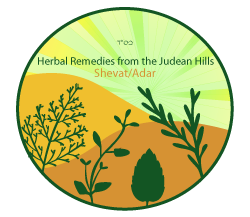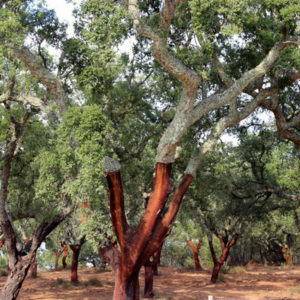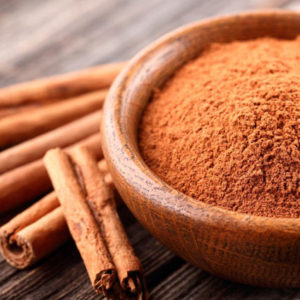Herbal Remedies from the Judean Hills
קִנָּמוֹן – Cinnamon – Cinnamomum Zeylanicum
Printable Version
The Spiritual Protective Warming Energy of Cinnamon
I have never in my life seen a cinnamon tree, as these exotic trees grow mainly in Sri Lanka and India. Little did I know that during Temple times the main trees growing in Jerusalem were cinnamon trees. I can’t wait till these richly scented trees with such uplifting and life-giving properties will once again grow in Israel! Cinnamon is an aromatic spice universally enjoyed both in incense, as a medicament and in cooking. We all use cinnamon to add flavor to oatmeal cookies, pumpkin pies, cereals and herbal teas. Since people are used to eating dried cinnamon, therefore its blessing is …borei p’ri ha’adama, [and not shehakol] (Sefer HaShelah Hakadosh, Sha’ar Ha’otiyot, kuf, Kedusha).
Cinnamon indeed makes us feel warm, safe and protected. Just as cinnamon is a natural anti-biotic, anti-viral, anti-fungal, and anti-microbial agent, with immune-boosting antioxidants, it possesses spiritual protective properties. Cinnamon has a high vibration, which is helpful for our own personal protection, for protecting our homes, and also for reaching higher states of spiritual and psychic ability. There are eleven Torah verses beginning and ending with the Hebrew letter נ/nun that our sages recommend as a spiritual remedy for protection against negative energy. One of these verses is נַפְתִּי מִשְׁכָּבִי מֹר אֲהָלִים וְקִנָּמוֹן (משלי ז, יז) – “I have perfumed my couch with myrrh, aloes, and cinnamon” (Mishlei7:17); (Sefer HaShelah Hakadosh, Tractate Ta’anit, Matot/Masei). Because of its spiritual protective properties, cinnamon was chosen to be one of the eleven ingredients of the Temple incense and one of the four spices in the holy anointing oil, which was used to anoint the Kohanim and Kings and to make the Temple vessels Kodesh – “most holy” (Shemot 30:29).
Cinnamon in the Holy Anointing Oil and Incense
Cinnamon’s renaissance will be completed with the coming of Mashiach, who as every King of Israel will be anointed with the holy anointing oil containing cinnamon. In fact, the definition of the word מָשִׁיחַ/Mashiach is ‘anointed.’ Parashat Ki Tisa gives the recipe for the holy anointing oil, which must not be duplicated for uses other than those specified in the Torah:
ספר שמות פרק ל פסוק כג-כה
וְאַתָּה קַח לְךָ בְּשָׂמִים רֹאשׁ מָר דְּרוֹר חֲמֵשׁ מֵאוֹת וְקִנְּמָן בֶּשֶׂם מַחֲצִיתוֹ חֲמִשִּׁים וּמָאתָיִם וּקְנֵה בֹשֶׂם חֲמִשִּׁים וּמָאתָיִם: וְקִדָּה חֲמֵשׁ מֵאוֹת בְּשֶׁקֶל הַקֹּדֶשׁ וְשֶׁמֶן זַיִת הִין: וְעָשִׂיתָ אֹתוֹ שֶׁמֶן מִשְׁחַת קֹדֶשׁ רֹקַח מִרְקַחַת מַעֲשֵׂה רֹקֵחַ שֶׁמֶן מִשְׁחַת קֹדֶשׁ יִהְיֶה:
“Take for yourself spices of the finest sort: of pure myrrh five hundred [shekel =15.87 grams or 0.56 oz]; of fragrant cinnamon half of it two hundred and fifty; of fragrant cane two hundred and fifty and of cassia five hundred according to the holy shekel, and one hin (37 litres nearly 10 U.S. gallon) of olive oil. You shall make this into an oil of holy anointment, a perfumed compound according to the art of a perfumer; it shall be an oil of holy anointment” (Shemot 30:23-25).
Rashi describes this fragrant cinnamon as the bark of a tree. Some cinnamon bark are fragrant while others are just like ordinary wood. Therefore, the Torah needed to tell us to use וְקִנְּמָן בֶּשֶׂם/kinamon bosem – the fragrant type. On the market, you can find products containing both Cinnamomum Zeylancium and Casia. It is the Zeylancium that is more aromatic and medicinal. Cinnamon is also part of the קְטֹרֶת/Ketoret – ‘incense’ described in Parashat Ki Tisa. The root of the word קְטֹרֶת/Ketoret, קטר/keter, is related to the word קשר/kesher, which means ‘connection.’ Thus, the word ketoret is associated with ‘connecting’ or ‘bonding.’ We need to bond in order to bring about the unity that makes us worthy of the Mashiach, may it be soon!
Growing in Israel since Biblical Times
Due to its use for holy purposes in the Torah, cinnamon must have been available to our Biblical ancestors. Rav Huna in the name of Rabbi Yossi said cinnamon trees would grow in Israel and the goats and deer could reach the tops and eat from them (Midrash Bereishit Rabbah 65:17). Perhaps the unity that pervaded Israel caused the land to produce the sweetest fragrance.
תלמוד בבלי מסכת שבת דף סג/א
אמר רבי יהודה עצי ירושלים של קינמון היו ובשעה שהיו מסיקין מהן ריחן נודף בכל ארץ ישראל ומשחרבה ירושלים נגנזו ולא נשתייר אלא כשעורה ומשתכח בגזאי דצימצמאי מלכתא:
Rabbi Yehuda said, the trees of Jerusalem were of cinnamon. When they would burn them, their fragrance would permeate the entire Land of Israel. However, once Jerusalem was destroyed, they did not remain but were hidden away (Babylonian Talmud, Shabbat63a).
While the Temple stood, no bride needed perfume on her wedding day. The incense from the altar was so ever-present, perfumes would have added nothing. The goats of Jericho, miles away to the northeast, would sneeze from its scent! (Babylonian Talmud, Yoma 39b). The Ben Yehoyada explains that the cinnamon was so abundant that it was burnt as firewood. He suggests that perhaps Hashem created such an abundance to show that Eretz Yisrael was given only for toiling in Torah. This is because it is known that fragrance open’s one’s mind, and so the cinnamon trees helped enable an atmosphere in Eretz Yisrael where even the air of the land increases knowledge. According to the Remak in his comments to Pitum Haketoret, cinnamon relates to chochmah (wisdom). Just as in the Ketoret there are nine measures of cinnamon, so too we learn that ten measures of chochmah came down to the world, nine of which were taken by Eretz Yisrael (https://treesinthedaf.wordpress.com/).
Never Lacking from the Pesach Seder Plate
Cinnamon is a spice that connects the entire Jewish people. Everyone puts it in their charoset for the Seder night. Although there are several different recipes for charoset they all include cinnamon. charoset is made from figs and apple puree to commemorate the mortar. The added ground nuts represent the Jewish people who are compared to nuts, while thin strips of cinnamon reminisce the straw that was mixed in it (Tiferet Yisrael, Yachin, Mishnah Pesachim 10:3). Cinnamon is known to have an anti-diabetic effect. According to several medical researches, consuming a large dose of cinnamon together with carbohydrate-rich foods can slow the absorption of sugar into the bloodstream, moderating the rapid rise and fall in blood sugar level that occurs after a meal filled with carbohydrates. This gives us an additional reason to add generous amounts of cinnamon in our charoset, especially when drinking four glasses of wine or grape juice and consuming sweet deserts at the Seder table!
Cinnamon for Brain Health
Among all the varied health benefits of cinnamon, I am most impressed with the recent studies revealing that cinnamon improves brain function. A small human study suggests that merely smelling the aroma of cinnamon can improve performance of several types of memory tasks. The researchers found that cinnamon improved participants’ scores on tasks related to attentional processes, virtual recognition memory, working memory, and visual-motor response speed (http://www.wju.edu/about/adm_news_story.asp?iNewsID=1106&strBack=%2Fabout%2Fadm_news_archive.asp). Cinnamomum Zeylanicum may also delay or reverse cognitive impairment. Research has found that it improved cognition and reduced oxidative stress in the brain (https://www.ncbi.nlm.nih.gov/pubmed/24559058). Cinnamon contains 68% manganese. Two teaspoons of cinnamon provides about half the RDA of manganese, a powerful antioxidant that is crucial for brain and body health. Another benefit of cinnamon’s protective antioxidant properties is that they can help defend the brain against developing neurological disorders, such as Parkinson’s and Alzheimer’s diseases. Thus cinnamon helps defend against cognitive decline and protects brain function. Since cinnamon contains so many antioxidants and anti-inflammatory compounds that reduce the effects of aging on the body and brain, in the future we may see it being used as a possible natural therapeutic treatment or prevention for age-related neuro-degenerative diseases (https://www.ncbi.nlm.nih.gov/pubmed/24946862).
Eternal Scent
At the time of his circumcision, Avraham was specifically likened to the fragrant cinnamon tree:
מדרש רבה בראשית – פרשה מו פסקה ב
וימול בן שמונים וששה שנים בשעה שנולד ישמעאל אמר ריש לקיש קנמון אני מעמיד בעולם מה קנמון הזה כל זמן שאתה מזבלו ומעדרו הוא עושה פירות כך משנצרר דמו משבטל יצרו משבטלה תאותו משנקשר דמו:
Then let him be circumcised at the age of eighty-six, when Ishmael was born? Reish Lakish said: [G-d said] : “ I will set up a cinnamon tree in the world: just as the cinnamon tree yields fruit as long as you manure and hoe around it, so [shall Avraham be] even when his blood runs sluggishly and his passions and desires have ceased” (Midrash Bereishit Rabbah 46:2).
If you take good care of the cinnamon tree even when it ages, it will produce fruit. Likewise, although Avraham was old and without physical desire when he was circumcised, he was able to give birth to the holy Yitzchak. Today, a healthy cinnamon tree can produce cinnamon bark for about 45 years. Perhaps in the time of the Torah it produced its aromatic bark for much longer. Why was Avraham’s circumcision at the age of 100 compared to a cinnamon tree? The holy covenant of circumcision is called ‘a good scent’ because it represents chastity. Likewise, overcoming sexual temptation brings about a sweet fragrance (Rav Tzaddok of Lublin, Pri Tzaddik, Bereishit1). Fragrance is connected to spirituality, as the word רֵיחַ /re’ach– ‘scent’ shares the same root as the word רוּחַ/spirit. Moreover, from our five senses, the sense of smell is the only one that wasn’t employed in the sin with the Tree of Knowledge. Since the cinnamon tree is the most fragrant of trees, it represents the highest degree of spirituality. Therefore, Avraham at the time of his circumcision was likened to a cinnamon tree. When his physical strength and desires had ebbed out due to his advanced age, and the power of his yetzer (passion) was nullified by means of the circumcision, that is when his spirituality and scent increased. Therefore, he needed to wait until the age of 100 to become circumcised to be at his peak of spirituality when he conceived the holy Yitzchak (Malbim, Bereishit17:1). Circumcision is literally cutting part of the physical body, removing the external part of the limb that is most associated with physical pleasure. Therefore, Avraham’s circumcision preluded the conception of the holy Yitzchak, which needed to be without any trace of lust and external physical pleasure. The crushing of physicality, which gives birth to the innermost spiritual, engenders the sweetest fragrance. Cinnamon is the spice that represents the finest fragrance of the highest spiritual achievement. This explains why – although the righteous in general are compared to sweet smelling spices – Avraham was specifically compared to cinnamon at the time of his circumcision.
Hands On:
I am still using up the wrinkled apples from my garden, making delicious applesauce which my granddaughters relish when served with shredded coconut and chocolate chips. It is also a nutritious late afternoon snack. No added sugar is necessary as the cinnamon brings out the natural sweetness of the apples.
Crockpot Cinnamon Applesauce
10 Large apples, peeled, cored and chopped into chunks
½ Cup water
2 tsp cinnamon
1. Add all ingredients to crock-pot.
2. Cook on the low setting for 6-8 hours.
3. Mix all ingredients and mash all clumps of apple or place in food processor until smooth.
https://www.berotbatayin.org
http://www.voices-magazine.com/#
http://www.voices-magazine.com/#



